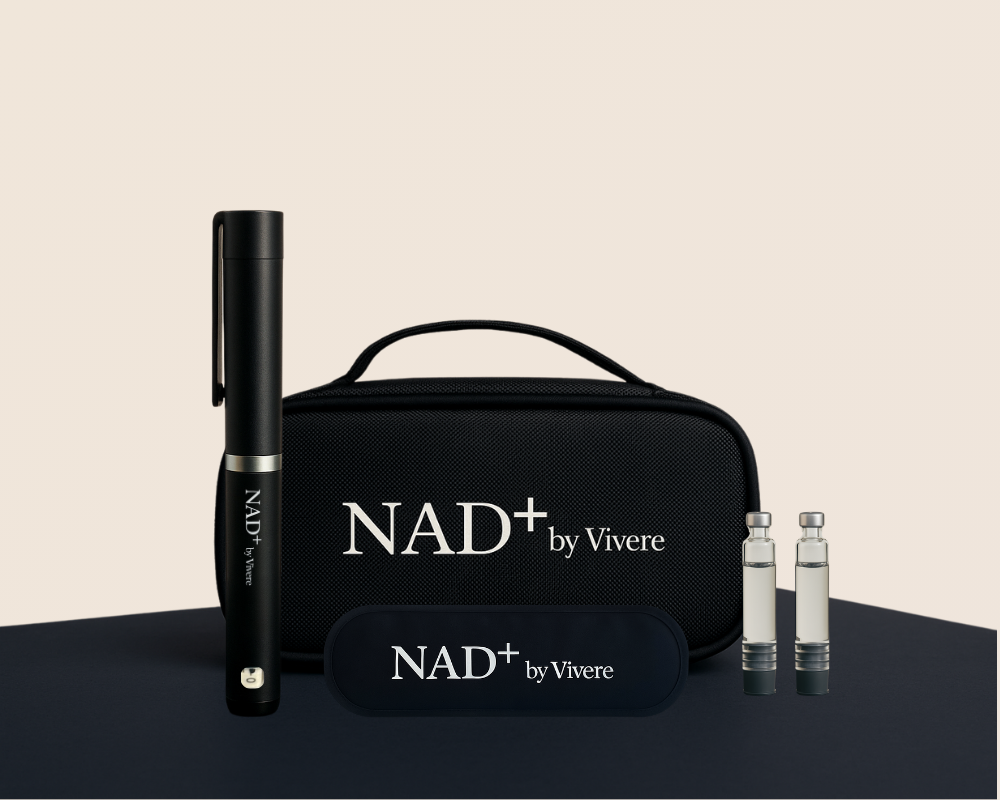NAD+ and Alzheimer’s: What Current Research Says About Brain Ageing
Last Updated: 12 February 2026

Alzheimer's disease continues to affect millions of people worldwide, including a growing number in the UK. New areas of research are shining a light on how cellular health may influence cognitive ageing, particularly the role of nicotinamide adenine dinucleotide (NAD+).
The insights provided in this article are supported by Vivere's Head of Nutrition, Yusra Serdaroglu Aydin, a registered dietitian with a background in nutrition, food engineering and culinary arts. Her approach is founded on scientific evidence and shaped by a strong understanding of personalised nutrition and the human microbiome, which is particularly relevant when exploring how cellular metabolism may affect long-term brain health.
This article breaks down current findings on NAD+, how it relates to cognitive decline, what early research suggests about its therapeutic potential and why careful interpretation of emerging evidence is essential.
In One Sentence:
“NAD+ supports vital cellular processes that influence brain ageing, and early research suggests it may play a protective role in Alzheimer's, although more human studies are needed”.
Key Takeaways
Here are the five biggest takeaways from this article about the link between NAD+ and Alzheimer's:
NAD+ is a coenzyme found in every cell, and its levels decline with age, which may affect processes linked to cognitive function.
Research suggests that restoring NAD+ in animal models can support memory, learning and neuronal resilience.
A recent human study exploring a supplement that increases NAD+ showed promising early results, but the findings remain preliminary.
Scientists believe NAD+ may influence pathways related to inflammation, mitochondrial function and DNA repair in the brain.
Although interest is growing, NAD+ supplements are not proven treatments for Alzheimer's, and further clinical trials are required.
What Is NAD+?
NAD+ is a molecule present in all living cells. It plays a key role in energy production, cellular repair and numerous metabolic reactions. As we age, NAD+ levels naturally fall. This decline can influence how well cells function, particularly in tissues that have high energy demand, such as the brain.
Because Alzheimer's is associated with mitochondrial dysfunction, oxidative stress and impaired cellular repair, researchers have begun to investigate whether maintaining or restoring NAD+ levels could support cognitive health.

Why Scientists Are Studying NAD+ and Brain Ageing
Alzheimer's disease is characterised by the accumulation of abnormal proteins, inflammation and the gradual loss of nerve cells. Scientists believe that reduced NAD+ may contribute to these changes in several ways.
Energy Production in the Brain
Neurons rely heavily on mitochondria to produce energy. NAD+ is central to this process. Lower NAD+ levels may limit mitochondrial efficiency, which can impair memory and learning. Animal studies have shown that boosting NAD+ can improve mitochondrial performance, helping neurons function more effectively.
Cellular Repair and Longevity Pathways
NAD+ is required for the activity of enzymes that repair DNA and regulate healthy ageing. Some researchers have suggested that supporting these pathways could help maintain brain resilience.
Inflammation and Neuroprotection
Chronic inflammation is involved in the progression of Alzheimer's. NAD+ appears to influence inflammatory pathways through its interaction with specific enzymes. This has led researchers to explore whether restoring NAD+ could help moderate inflammation in the brain.
What Recent Research Suggests
A study published in Science Advances investigated how NAD+ restoration affected brain ageing in experimental models. Researchers found that raising NAD+ levels supported neuronal health, improved memory-related function and reduced structural changes associated with cognitive decline. These results indicate a potential therapeutic avenue that warrants deeper investigation [1].
Around the same time, a separate early-stage human study examined whether a supplement designed to raise NAD+ levels could improve cognitive function in individuals with memory loss. The study reported potential benefits, with participants showing signs of improved recall. The findings were limited to a small sample and a short timeframe, but they generated significant interest in whether NAD+ could influence brain ageing in humans.
Together, these developments have accelerated scientific discussion about NAD+ and Alzheimer's, although experts caution that it is too early to draw firm conclusions.
Understanding the Limitations of Current Evidence
While laboratory and early human results are encouraging, several limitations exist.
Small Study Sizes
Current human research includes only small groups of participants. Studies of this size cannot establish strong conclusions and often act as a starting point rather than proof.
Short Follow-Up Periods
Most studies track changes in NAD+ or cognitive outcomes for weeks or months. Alzheimer's progresses over many years, so long-term trials are essential to understand whether NAD+ truly makes a difference.
Variability in Supplements
Various supplements aim to boost NAD+, including nicotinamide riboside and nicotinamide mononucleotide. These differ in their stability, bioavailability and effectiveness. Not all products have been tested in clinical settings, and quality can vary.
Complex Nature of Alzheimers
Alzheimer's is influenced by genetics, lifestyle, metabolic health and environmental factors. It is unlikely that any single nutrient or supplement can fully address the condition. Supportive nutrition, physical activity, sleep and cognitive engagement remain vital foundations for maintaining long-term brain health.
Could NAD+ Support Healthy Ageing?
Even without considering Alzheimer’s directly, NAD+ plays an important role in ageing. Research continues to explore how it may influence:
Mitochondrial Function
Healthy mitochondria support sustained energy production and reduce the burden of oxidative stress.
Genetic and Cellular Maintenance
DNA repair, protein folding and cellular detoxification rely on adequate NAD+.
Metabolic Health
NAD+ is closely linked to glucose and lipid metabolism, which are important for maintaining overall health, including cognitive wellbeing.
Supporting NAD+ levels through nutrition and lifestyle may have long-term benefits. Foods rich in niacin, regular physical activity and good sleep hygiene can help maintain natural NAD+ production. These strategies are safe, accessible and beneficial for wider health.
The Future of NAD+ Research in Alzheimers
The scientific community is continuing to examine how NAD+ affects neurodegenerative conditions. Large-scale human trials are needed to determine whether restoring NAD+ can genuinely slow cognitive decline or support therapeutic outcomes for Alzheimer's patients.
Many researchers believe the future will involve a combination of early detection, personalised interventions, microbiome-informed nutrition and targeted therapies. NAD+ may become one part of a broader strategy rather than a standalone solution.
Nutritionist’s Corner: Final Thoughts
“NAD+ has become a compelling area of research in relation to ageing and cognitive decline. While early evidence suggests it may support brain health and potentially influence factors linked to Alzheimer's, it is important to interpret studies with care. Larger clinical trials will help determine whether NAD+ can offer meaningful support for those living with conditions like Alzheimer’s. In the meantime, balanced nutrition, regular physical activity, and lifestyle habits that protect metabolic health remain essential for long-term cognitive wellbeing”.
Vivere helps you take control of your health with personalised insights from state-of-the-art gut microbiome testing, nutritional guidance, science-backed supplements, NAD injections and expert support. Sign up today and start living better, for longer.
Sources
Author

Yusra Serdaroglu Aydin, MSc RD
Head of Nutrition and Registered Dietitian
Yusra is a registered dietitian with a multidisciplinary background in nutrition, food engineering, and culinary arts. During her education, her curio...